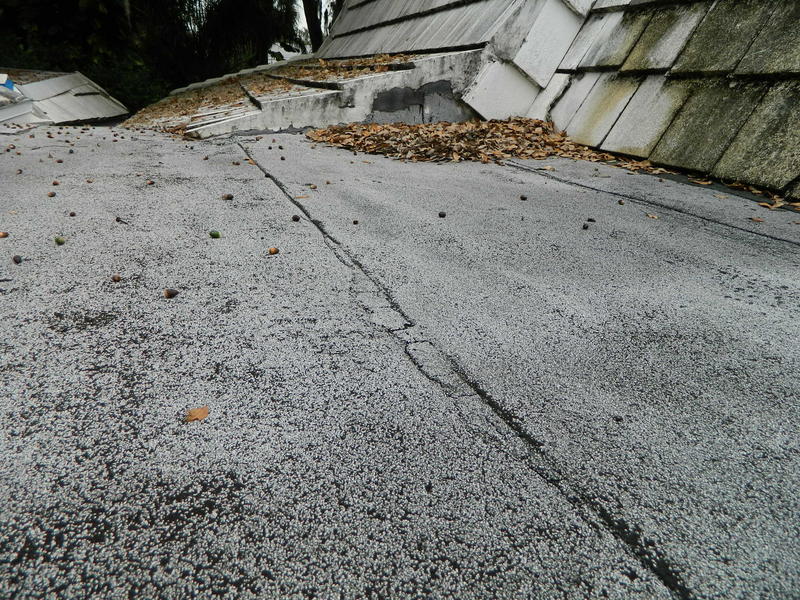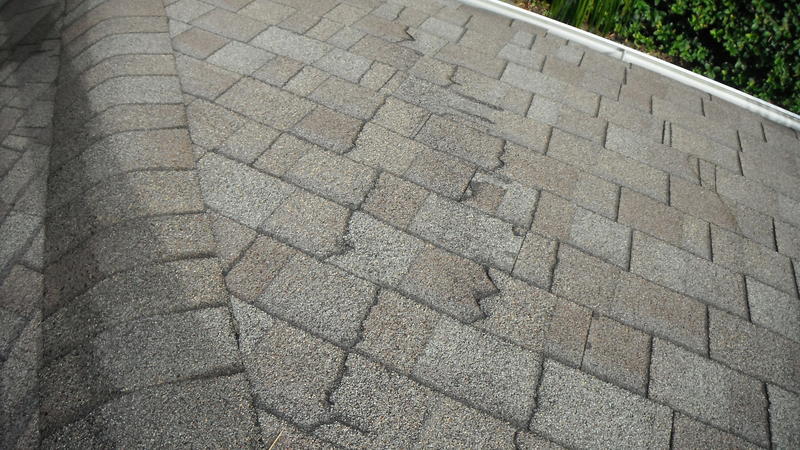This roofing system is a granulated surface, modified bitumen system installed over a wooden deck. It is in SW Florida, installed in 2003, and went through Hurricane Charlie in 2004.
It’s 9 years old and appears to be closer to 14 years old. It’s wearing like mineral surface rather than modified bitumen.
I’m curious as to what may cause this product to deteriorate prematurely. Some options are manufacturers defect, tar too hot when applied, lack of one way vents every 100 sf, etc.
Any other ideas?
The seller said that the roof was replaced in 2010. They bought the house in 2011 and didn’t have a inspection. As it turns out there was no permit and it appears that it is the original roof from 1999. Client had a roofer come out and they wanted to replace it all for $13,000.
Good point, but this one was permitted and the roofer is local. I know it was installed in late 2003.:shock:
the alligatoring looks like a top coat of something
Any home in any state is lucky to get 10 years life on rolled roofing, of any manufacturer. Observe, document, suggest, your job is done. It needs replaced. Take pictures. You do not need to go any further.
Any inspector, who gets curious, is looking for trouble/litigation.
So if I understand you correctly, a home inspector should never try to understand why something is deficient or why it is prematurely aging?
The OP never mentioned anything about telling the buyer why the roof was aging.
When you got your training, did you not ask your mentor the “why” question? Or did you simply take his word for it? Have you been inspecting houses the same way for the last 10 years with no continuing education, no improvement of your knowledge, no improvement of your process?
To understand the why of things can only make you a better inspector.
Do you write up the lack of GFCI just because it’s code and you have to write it up, or do you write it up because you know it is a safety hazard not to have them and you can explain how it works to you client and the potential consequences of not having them?
When a client asks you the “Why” question, do you answer with him/her or do you tell them I don’t know or I won’t answer because if I get too curious I could get in trouble?
We need some premature capitulation by the shingle manufacturers! They’re producing unsatisfactory products that are sold at exhorbitant prices and then weasel out of overstated warranties.
Just checked around a bit this AM for class action lawsuits in Canada:
-
BP (Building Products, an ESSO/EXXON company) just settled a suit this summer
-
Certainteed and IKO have class-action suits pending
This type of information should be spread far and wide so that they might decide to improve their offerings!
Why do you care? Why are you curious?
It is bad. Recommend replacement. Age should not matter to you. There are many reasons why things go bad. I wolrked with a mentor for only 6 weeks before going out on my own. Training is only worth money to the person/company who gets paid from providing the class. Most are not worth much. Only actural work experience gets you the proper training.
As a licensed roofing contractor (I no longer roof, only inspect), the customer hired me to give them an independent assessment of the condition of their 9 year old roof. They’ve had one leak and the two roofer’s they called for repair estimates both have recommended a new roof. They felt like either they are about to be taken advantage of or they were taken advantage of 9 years ago.
I posted on the MB to see if anyone else has ran into a similar situation. While I pride myself on my roofing knowledge, I’m always learning something new.
I have never seen alligatoring like that on a modbit roof, usually built up roofs. It is interesting how the granules cover the lap seam bleed out as well; most roofers don’t bother with extra granules. Without knowing more about the building/history I’d say it’s just a poor product.
Update. I just spoke with the roofer who installed it. It’s a 3-ply (base, smooth, and cap) system over a tapered system (insulation board).
The insulation board tends to hold heat and shorten the life of the roofing material. Solution, install a new cap sheet in about a year.







